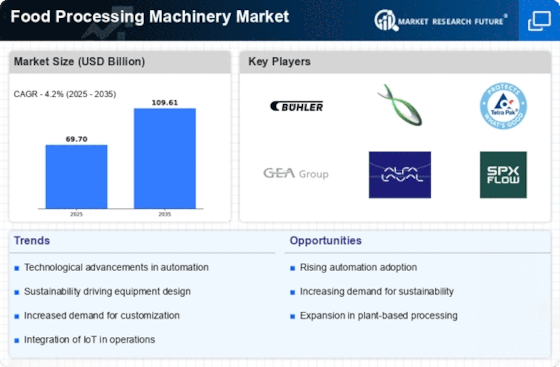Top Industry Leaders in the Food Processing Machinery Market

*Disclaimer: List of key companies in no particular order
Top listed global companies in the Food Processing Machinery industry are:
SPX Corporation
Anko Food Machine Co. Ltd.
Berkshire Hathaway Inc.
Mallet & Company, Inc.
John Bean Technologies Corporation (JBT)
Bucher Industries
Hosokawa Micron Corp.
GEA Group
NICHIMO CO., LTD.
Tetra Laval International S.A.
Bridging the Gap by Exploring the Competitive Landscape of the Food Processing Machinery Top Players
The food processing machinery market is a dynamic and ever-evolving space, driven by rising demand for processed food, increasing safety and hygiene concerns, and technological advancements. This competitive landscape is characterized by a mix of established players and emerging entrants, all vying for a larger slice of the pie.
Key Player Strategies:
Market Leaders: Established giants like Bühler AG, Tetra Laval, and GEA hold significant market share through their extensive product portfolios, strong brand recognition, and global distribution networks. They leverage their research and development capabilities to constantly innovate, offering cutting-edge solutions for automation, efficiency, and sustainability.
Regional Players: Regional players like Anko Food Machine and Atlas Pacific cater to specific geographic needs and offer cost-effective alternatives. They excel in customized solutions and after-sales support, building strong customer relationships within their regions.
Emerging Entrants: Startups and niche players are disrupting the market with specialized technologies and innovative solutions. They focus on specific segments like smart packaging, robotics, and AI-powered process optimization, offering agility and quicker adaptation to changing market trends.
Factors for Market Share Analysis:
Product Portfolio: The breadth and depth of a company's product offerings play a crucial role. Catering to diverse needs across various food processing segments (dairy, bakery, beverage) and offering modularity/customization options strengthen market position.
Technological Innovation: Continuous investment in R&D and adoption of automation, digitalization, and data analytics are essential for staying ahead of the curve. Companies offering intelligent machinery and process optimization solutions gain a competitive edge.
Geographical Presence: A strong global footprint with efficient manufacturing and distribution networks facilitates faster delivery, better service, and deeper market penetration.
Brand Reputation: Established brand names with a strong track record of quality, reliability, and customer service inspire trust and loyalty, leading to higher market share.
New and Emerging Trends:
Sustainability Focus: Growing consumer demand for environmentally conscious food production pushes companies to develop energy-efficient machinery, reduce waste generation, and utilize sustainable materials.
Food Safety and Hygiene: Stringent regulations and heightened consumer awareness necessitate machinery with advanced hygiene features, automated sanitation protocols, and traceability solutions.
E-commerce and Digitalization: The rise of online food delivery and direct-to-consumer models is driving demand for flexible, adaptable, and data-driven machinery that integrates with e-commerce platforms.
Personalization and Customization: Consumers crave unique food experiences, leading to a trend towards modular machinery and customizable processing options that cater to specific dietary needs and preferences.
Overall Competitive Scenario:
The food processing machinery market is expected to witness steady growth in the coming years, driven by the aforementioned factors. The competition will remain intense, with established players facing pressure from nimble startups and regional specialists. Success will hinge on a combination of factors:
Continuous Innovation: Companies that stay ahead of the technological curve with intelligent solutions and automation will thrive.
Strategic Partnerships: Collaborations with food processors, technology companies, and research institutions can accelerate innovation and market reach.
Focus on Sustainability and Food Safety: Addressing environmental and hygiene concerns through sustainable practices and advanced machinery will resonate with consumers.
Customer-Centric Approach: Providing excellent customer service, customized solutions, and efficient after-sales support will build lasting relationships and brand loyalty.
In conclusion, the competitive landscape of the food processing machinery market is a dynamic and complex one. Understanding the key players' strategies, market share analysis factors, and emerging trends is crucial for both established companies and new entrants to navigate this space successfully. Adaptability, innovation, and a customer-centric approach will be the defining characteristics of the winners in this evolving market.
Latest Company Updates:
SPX Corporation:
- Date: January 10, 2024
- Source: SPX Corporation Press Release
- Development: Launched new high-efficiency mixer for bakery and snack applications, targeting operational cost reduction and improved product quality.
Anko Food Machine Co. Ltd.
- Date: December 15, 2023
- Source: Anko Food Machine website
- Development: Unveiled AI-powered smart dough production line, automating dough making and shaping processes for enhanced accuracy and efficiency.
John Bean Technologies Corporation (JBT)
- Date: January 4, 2024
- Source: JBT Investor Relations website
- Development: Announced strong quarterly financial results, highlighting continued growth in food and beverage processing segments.
Bucher Industries:
- Date: December 8, 2023
- Source: Bucher Industries Press Release
- Development: Secured major contract to supply fruit and vegetable processing equipment to a large food producer in Asia.










